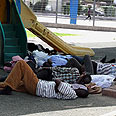
Hospital eases African refugees' isolation policies
Following public condemnation, Health Ministry orders Sourasky Medical Center to alleviate restrictions on hospitalization policies of African refugees
Tel Aviv’s Sourasky Medical Center has rescinded some of its strict policies regarding the treatment of African refugees, which included their isolation from the general public – a move that sparked condemnation from the Health Ministry and doctors across Israel.
Last week, Sourasky's Director General Gabi Barbash announced that the medical center will restrict admissions and visits by African refugees out of concern for the spread of infectious diseases to other patients.
Related stories:
- Israel mulling long-term detention of illegal migrants
- Israel court clears deporting South Sudan migrants
- Doctors blast hospital's African refugee isolation policy
After receiving a letter which outlined the new policies which are intended to protect patients and hospital staff, doctors called Barbash's decision "patient care apartheid."
Barbash said that any patient of African origin who requires hospitalization will receive a mandatory chest x-ray in order to rule out tuberculosis.
Criticism over Barbash's decision was soon to follow, as doctors voiced their opposition to the controversial policies. The Health Ministry further criticized Barbash's choice, calling it a "racist policy."
Over the weekend, the Health Ministry published refugee patient care guidelines that are to be implemented in the hospital: African women in labor are to be isolated in a separate ward until they are screened for infectious diseases, while African women in labor who are suspected of carrying an infectious disease will be transferred to an internal ward but are not to be isolated.
Furthermore, premature babies of African women are to be isolated until their mothers have been given a "clean bill of health," while newborn babies are not to be isolated.
Regarding refugee visitation rights, the new ministerial guidelines will allow for visitors to enter one at time in hospital wards where there is a high risk of infectious diseases.
According to the guidelines, visitors who wish to see patients who are hospitalized in high-risk wards will be questioned about their medical status and if they are suspected of being ill with tuberculosis, they will receive a mandatory chest x-ray in order to rule out the disease.
- Receive Ynetnews updates directly to your desktop










